The difference between an inverter air conditioner and an ordinary one: their advantages and disadvantages + which is better to choose
There is only one important difference between an inverter air conditioner and a conventional one, but it divides outwardly similar equipment that solves one problem into two different subspecies.
Since the only feature affects all the basic characteristics - performance, functionality, efficiency and even cost.
Therefore, the choice should be made after familiarizing yourself with the advantages and disadvantages of each type of equipment. Otherwise, it is highly likely that the expected result will not work.
The content of the article:
Differences and determining the best type of air conditioner
Without a third-party clue, a person who does not have special knowledge is unlikely to distinguish inverter air conditioner from ordinary. The reason is that they look the same and are able to provide a comfortable temperature in the room.
Let us consider in more detail the main differences between these seemingly identical varieties of climatic equipment and figure out which one is better to buy.
Difference # 1 - the principle of operation of technology
There is still a difference between the inverter and conventional types of technology, and the cardinal one lies in the different operating principles that affect all other characteristics, including performance and cost.
Therefore, you should know that:
- conventional air conditioning works in cycles;
- the inverter unit operates continuously.
So, if a traditional type of equipment is included in the network and programmed, then it will immediately begin to cool the air in the room, using 100% of its capacity.
And when the temperature specified by the user is reached, it will turn off. More precisely, air cooling will stop, while the governing body will continue to work.
That is, further the processor, using the readings of the temperature sensor, will simply compare the difference between the real and the desired temperature. Upon reaching the maximum permissible deviation, the air conditioner will again begin to cool the air masses, again with one hundred percent power.
And such cycles will be repeated regularly, but at different intervals, throughout the operation.
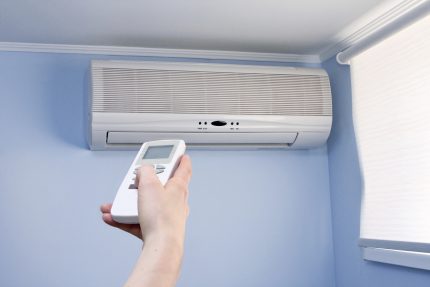
After connecting to the network and programming, the inverter analog will initially function similarly to a conventional product. That is, he as quickly as possible, using all his resources, will try to cool the air to the desired level.
But then it will not turn off, like a traditional unit, but will switch to a "sleep" mode of operation. During which it will perform cooling, using 5-10% of the available capacity, which will maintain the temperature set by the user, and using a minimum of resources, electricity.
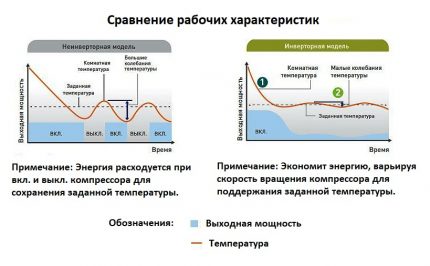
The described differences in the principle of operation leaves its mark on all the basic characteristics of the equipment.
Namely, on:
- functionality;
- profitability;
- resource;
- reliability;
- noisiness
- health effects;
- cost.
And when choosing, all of the above should be taken into account, because the difference between modern inverter and conventional cyclic air conditioning is much greater than many buyers imagine. And none of them has a clear advantage.
Difference # 2 - Hardware Functionality
Any of these types of equipment is able to cope, and effectively, with air cooling. But when comparing the difference in time spent, electricity in each individual situation will be noticeable.
Due to the more stable operating mode, inverter air conditioners have several advantages. Among which are called durability, reliability and profitability.
And this is so, but the question is whether the user can get the promised savings of 30-40% and even 50%, as indicated in the advertising of individual models. The answer here is unequivocal: no. This is especially true given the high cost of more advanced inverter products.
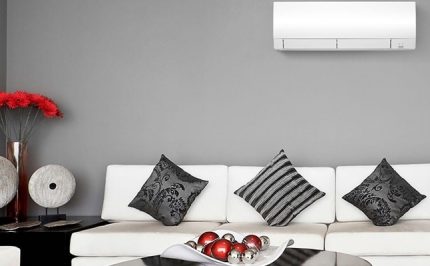
These features make the inverter air conditioner more practical when working in bedrooms, hotel rooms and other rooms where the temperature is stable. And here less time and energy will be spent than when using conventional analogues.
This is due to the fact that more high-tech inverter products are able to maintain temperature more accurately and with less deviations. Namely, within half a degree to a greater or lesser side from the value set by the user.
For comparison: in conventional air conditioners, the temperature delta is within 3 ° C, that is, the spread will be 1.5 ° C in each direction from the programmed level.
Which, together with high working power when used in bedrooms, other similar rooms, leads to the periodic occurrence of air flows, which, at a minimum, do not increase the comfort of living and recreation.
But the impressive peak power of any traditional air conditioner in comparison with inverter analogs makes them more functional, practical where there are sharp and frequent changes in temperature conditions.
This often happens even in an ordinary kitchen, where additional sources of heat, in the form of gas, electric stoves, other equipment, lead to a change in conditions. And here the cyclicality and maximum speed of traditional air conditioners will be the best solution.
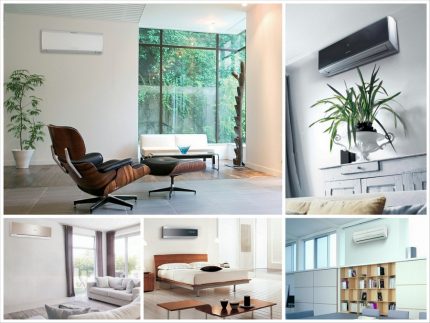
At the same time, their inverter analogs under unsteady temperature conditions will not prove to be the best. The situation will be similar in walk-through offices, shops, office premises, where the thermal background often changes.
In some situations, the advantages of the inverter to one degree or another will be leveled by the capabilities of not the most effective, but better adapted to certain conditions, design of conventional units.
Conventional air conditioning will be the best option when the air needs to be cooled once. For example, this happens in conference rooms.
That is, we can conclude that inverter models will be a successful acquisition in conditions when the set temperature you just need to maintain and when there are no frequent and significant changes. A conventional air conditioner will show its best qualities under dramatically changing conditions.
All modern inverter climatic equipment has an important plus - the ability to heat the premises in extreme cold, up to -25 ° C. What can not be achieved from their traditional counterparts due to the principle of operation.
The reason is the cyclical nature, which leads to the fact that the lubricant used for moving structural elements in the off position at a temperature that drops below -5 ° C quickly polymerizes, that is, freezes. As a result, it is better not to use the air conditioner until the heat comes.
If such a rule is ignored, then everything will end with early breakdown, possibly even at the first start.
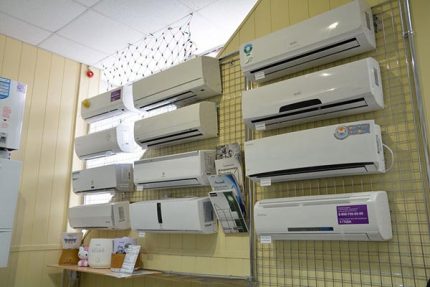
With an inverter air conditioner operating continuously, the described situation can only happen at extreme temperatures. But still you need to understand that it is hardly advisable to heat the premises with such equipment, and in many cases it will not be able to provide comfort at all.
Difference # 3 - Resource Efficiency
In advertising and other sources, one can often find information stating that inverter air conditioners consume an order of magnitude less electricity. It is often even indicated that savings can reach an impressive 30-40% compared to conventional counterparts.
But such information should be skeptical, since such calculations are nothing more than theoretical assumptions. And no one performed real calculations.
As a result, it can be considered that inverters are more economical, but given their high cost, it is unlikely to be able to benefit from the short term of use.
And in the next 5-10 years, most likely, there will be an even more economical, modern and efficient kind of equipment. As a result, using an inverter for how long will simply not be a profitable solution.
So it turns out that not a single type of air conditioner has a clear advantage in this category.
Regarding the working life of air conditioners, it will turn out on the Internet to find a fairly large number of claims that inverters using a small power reserve have less wear on moving parts and mechanisms. That provides them with a significantly greater operational resource.
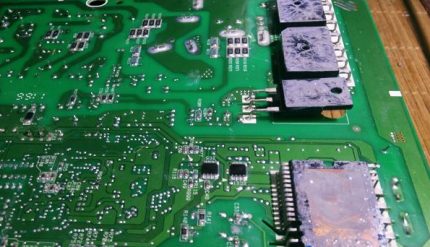
It is often indicated that a conventional unit will delight users almost 2 times less time. But such statements are more like marketing tricks of manufacturers, sellers. Since no serious independent organization has conducted any research.
And also be aware that the most loaded part of any air conditioner is the compressor that moves the refrigerant.
Therefore, according to logic, it should break down in the first place, and this should happen as a result of mechanical wear and critical overruns of the magnitude of the starting currents, exceeding the usual values by 5-7 times.
But just remember that compressor is the most loaded element in refrigerators, a number of other units, as well as in older models of air conditioners. And all of these products are able to work for decades, and without breakdowns.
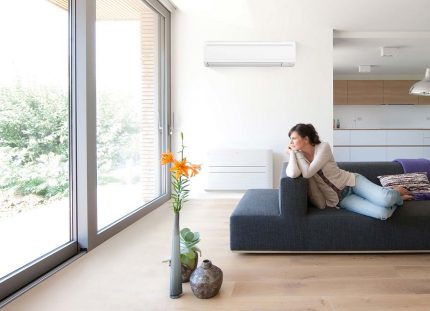
Difference # 4 - reliability during operation
When trying to find out how the modern inverter air conditioner differs from the non-inverter familiar to most people, it turns out that nothing. Since for years and without breakdowns, equipment belonging to any variety is able to function.
But you should be aware of one important feature of inverters: they are quite sensitive to voltage drops, and not even the most impressive ones. Therefore, if there is such a problem, you should always give preference to the usual variety of climatic equipment.
Otherwise, one of the two electronic boards that divide the air conditioners into conventional and inverter ones may fail. As a result, the user will have to pay the amount of money for repairs, on which you can buy a new inexpensive non-inverter.
And in many cases, you will have to wait, and sometimes quite a long time, because due to the high cost of these components, not every service will allow itself to be kept "in reserve".
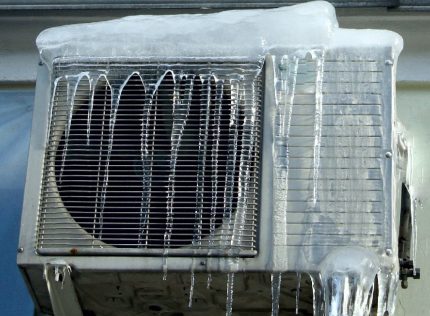
For the sake of objectivity, the latter scenario should not be considered as a key one, since the boards of inverter air conditioners fail rarely enough, but still 0.5-1% of buyers will have to face such a problem.
Difference # 5 - additional options and cost
Fans of comfort pay special attention to the volume of work, but here everything is simple. And this is because most air conditioners consist of two units: internal and external. Moreover, the latter is intended for mounting a noisy component of a structure, which is a compressor.
In the end, it can be argued that the level of comfort is not a single variant will not lower.
You can find information indicating that inverter air conditioners supply warmer air to the room (with a temperature of 12-16 ° C) and this gives users less chance of getting sick.
But again, no one confirms such statements, that is, no studies have been conducted. Therefore, these data are the product of marketers and both subspecies do not particularly affect human health.
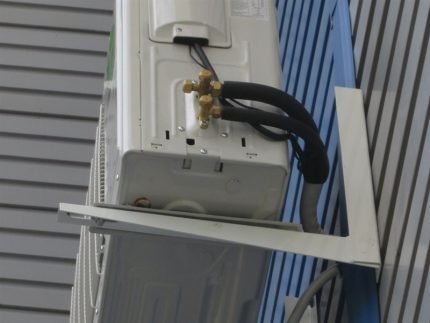
Although the poorly located classic unit with its powerful jet of air can really cause a cold. But such a problem is more related to improper installation or general product selection.
If you compare the price tags of models that are similar in functionality and performance, but related to different subspecies, it turns out that you will have to pay more for inverters than for ordinary ones. And it’s significant - the difference can be an impressive 40%.
Pros and cons of two types of vehicles
Above, we examined all the main points that affect the performance characteristics that buyers pay attention to. Since there are many of them, we highlight the key features that affect the correct choice.
Climatic equipment benefits
First, consider the main advantages of inverters, and then compare them with the usual type of technology.
The main advantage of any inverter air conditioner is the ability to provide a higher level of comfort in various rooms. Where the temperature background is stable and needs to be maintained, for example, in residential premises.
And also where a special regime is needed, for example, a wine cellar, a gym, as well as where some rarities (books, paintings) are stored or in a home greenhouse.
Inverters have certain advantages in energy efficiency, functionality. But they should not be taken into account by tenants, people who plan to change housing, since they will not allow real advantages to be obtained, at least in the next many years, as is the case with economy.
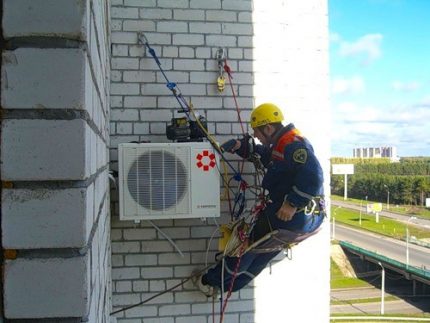
At the same time, classic air conditioners will more efficiently create the necessary microclimate if you need to do this one-time or cope with sharp temperature fluctuations.
Another plus of non-inverters is that they are almost half cheaper, which eliminates some advantage of inverter analogs in energy efficiency.
Also, ordinary models are more maintainable. This fact confirms the lower cost of the recovery process.
And the likelihood of downtime due to breakdown in this type of air conditioner is lower. What makes them the best solution for cooling air in rooms where a stable temperature regime is critically needed, for example, in server rooms.
An important advantage of classic units is their great adaptability to the realities of power supply in our country. Namely, to frequent power surges, even in many large cities.
Disadvantages of different types of air conditioners
A significant minus of inverters is that when buying such a product, you can not save. That is, you should not buy an aggregate belonging to the budget segment - they have a narrow range of compressor power adjustments (within 40-70%).
As a result, cheap models simply can not cope with maintaining a given temperature regime. Today, the optimal indicator is the range of 5-90%. If there is no money for this option, then it is better to purchase a budget ordinary air conditioner from a well-known manufacturer.
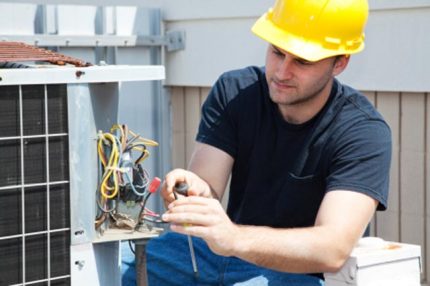
Besides, inverter model It is recommended to buy a little more power than is required in a particular situation, according to calculations. Since this guarantees quiet, economical and efficient cooling of the air masses.
When buying traditional air conditioners, it should be borne in mind that significant overruns of starting currents can be a problem for the power grid if it is outdated and was not designed to use such equipment. And this is a danger to users.
Conclusions and useful video on the topic
The first video will help you better understand the topic:
The second video material is dedicated to the differences in types of equipment:
If in doubt, which is more practical: inverter air conditioner or conventional and don’t know which one is better to choose, you first need to evaluate your living conditions. Evaluation of the latter will help determine which type of air conditioner will show its best properties in the room where it is supposed to be installed.
By the way, installation is also not worth saving - a similar approach will eliminate problems with air cooling, and, therefore, the buyer will not be disappointed in the acquisition.
If you still have questions, you can ask them in the box below. Please leave your comments, share your experience in the block below.

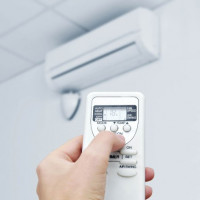 Which brand air conditioner is better to choose for an apartment: the best manufacturers of various types of equipment
Which brand air conditioner is better to choose for an apartment: the best manufacturers of various types of equipment 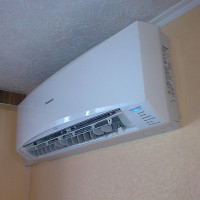 What is an inverter air conditioner and how does it differ from ordinary
What is an inverter air conditioner and how does it differ from ordinary 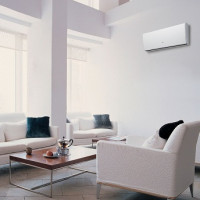 Air conditioning or split system - which is better? Comparative review
Air conditioning or split system - which is better? Comparative review 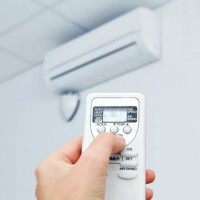 Gree air conditioner error codes: how to decipher the fault symbol and repair the unit
Gree air conditioner error codes: how to decipher the fault symbol and repair the unit 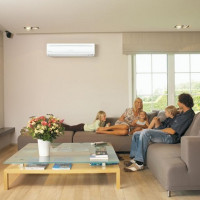 How to choose an air conditioner for home and apartment: varieties, manufacturers + selection tips
How to choose an air conditioner for home and apartment: varieties, manufacturers + selection tips 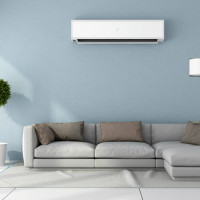 How to choose a split system in an apartment and in a house: the best brands + recommendations to customers
How to choose a split system in an apartment and in a house: the best brands + recommendations to customers 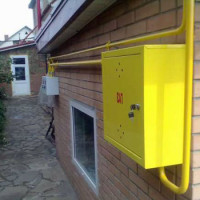 How much does it cost to connect gas to a private house: the price of organizing gas supply
How much does it cost to connect gas to a private house: the price of organizing gas supply  The best washing machines with dryer: model rating and customer tips
The best washing machines with dryer: model rating and customer tips 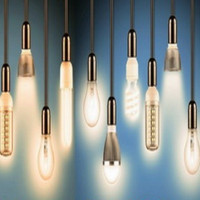 What is the color temperature of light and the nuances of choosing the temperature of the lamps to suit your needs
What is the color temperature of light and the nuances of choosing the temperature of the lamps to suit your needs 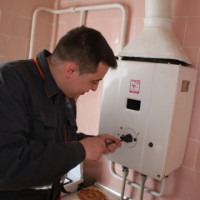 Replacement of a geyser in an apartment: replacement paperwork + basic norms and requirements
Replacement of a geyser in an apartment: replacement paperwork + basic norms and requirements
A conventional air conditioner is more suitable for me, since it costs less than an inverter. And plus everything, I like periodic work more, since I haven’t turned it on for so long. It gets cold under the air conditioner and it blows. Therefore, I turn it on for a short time, while I leave the room, so that by my arrival the room will cool. Because inverter I do not need.
And here I am, Anna, working at home, so an inverter air conditioner suits me better. Of course, depending on what purpose you need it for. I like it when a constant temperature is comfortable for me in the room, so as not to take on the remote control every time I need to turn it on or off.
Except that, for now, I doubt that invertor condic is more profitable. It turns out, save on energy, but overpay for the cost? I wonder what others think about this?
I have to disappoint you, but buying an inverter just to save on electricity, you are likely to spend extra money and time. The cost of a good inverter is space. And if we take into account the fact that you will not find a good master in inverters during the day with fire, then this idea completely becomes meaningless. Some part will fly, and then you will be looking for a master, and if you find it, you will wait for the part for two months, and also pay a decent amount.
So, regarding kondeya, it’s better to take a regular one and not take a steam bath. There, for purchase and repair, the order of prices is adequate.
Good afternoon, Konstantin. To operate with numbers, I advise you to use our article “How much electricity does the split system consume". The author takes a conventional air conditioner, consuming 700 watts * hour, and receives a monthly power consumption of 168 kWh, and a monthly fee for electricity - 900 rubles.
Inverter, he writes, consumes 0.5 ~ 0.6. Take an average of 550 watts * hour. This is 78% of 700. In other words, 22% of electricity is saved, and 131 kWh is consumed monthly. The fee drops to 700 rubles.
If we consider new models - for example, Samsung New Boracay, which began to be sold in April, then its efficiency is much higher - 31%. With it, the monthly fee will be 620 rubles.
The difference in annual fees is (900 rubles - 620 rubles) * 12 = 3360 rubles.
The model that the author is considering - ASW-H07A4 - costs ₽23500, Boracay - ₽32990. The price difference is 9490 rubles.
Now it is clear that the inverter will pay off for the saved electricity in three years.
The choice of a split system is just the case when it is best to do as most do - buy the usual one. Firstly, it will initially be cheaper, and secondly, it’s very unpretentious in maintenance. Plus, again, repairing an ordinary split costs adequate money, unlike the same inverter, which is certainly more reliable and economical, but not worth the money that is asked for it.